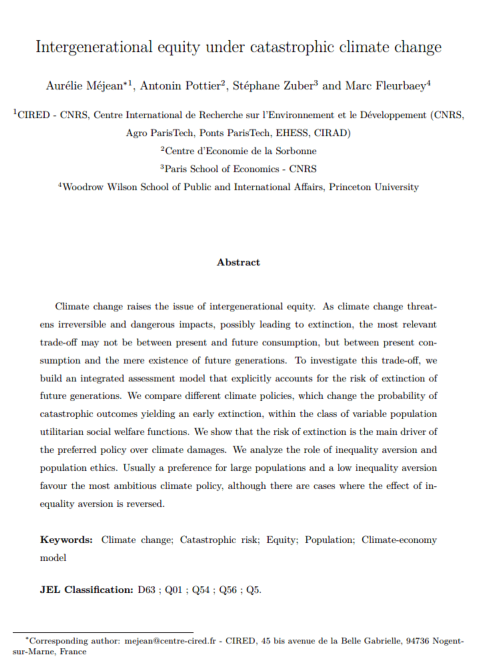Intergenerational equity under catastrophic climate change
Aurélie Méjean (CNRS, Paris), Antonin Pottier (Centre d’Economie de la Sorbonne), Stéphane Zuber (Paris School of Economics - CNRS) and Marc Fleurbaey (Princeton University)
GPI Working Paper No. 5-2020, published in Climatic Change
Climate change raises the issue of intergenerational equity. As climate change threatens irreversible and dangerous impacts, possibly leading to extinction, the most relevant trade-off may not be between present and future consumption, but between present consumption and the mere existence of future generations. To investigate this trade-off, we build an integrated assessment model that explicitly accounts for the risk of extinction of future generations. We compare different climate policies, which change the probability of catastrophic outcomes yielding an early extinction, within the class of variable population utilitarian social welfare functions. We show that the risk of extinction is the main driver of the preferred policy over climate damages. We analyze the role of inequality aversion and population ethics. Usually a preference for large populations and a low inequality aversion favour the most ambitious climate policy, although there are cases where the effect of inequality aversion is reversed.
Other working papers
Economic inequality and the long-term future – Andreas T. Schmidt (University of Groningen) and Daan Juijn (CE Delft)
Why, if at all, should we object to economic inequality? Some central arguments – the argument from decreasing marginal utility for example – invoke instrumental reasons and object to inequality because of its effects…
Will AI Avoid Exploitation? – Adam Bales (Global Priorities Institute, University of Oxford)
A simple argument suggests that we can fruitfully model advanced AI systems using expected utility theory. According to this argument, an agent will need to act as if maximising expected utility if they’re to avoid exploitation. Insofar as we should expect advanced AI to avoid exploitation, it follows that we should expected advanced AI to act as if maximising expected utility. I spell out this argument more carefully and demonstrate that it fails, but show that the manner of its failure is instructive…
Misjudgment Exacerbates Collective Action Problems – Joshua Lewis (New York University) et al.
In collective action problems, suboptimal collective outcomes arise from each individual optimizing their own wellbeing. Past work assumes individuals do this because they care more about themselves than others. Yet, other factors could also contribute. We examine the role of empirical beliefs. Our results suggest people underestimate individual impact on collective problems. When collective action seems worthwhile, individual action often does not, even if the expected ratio of costs to benefits is the same. …

